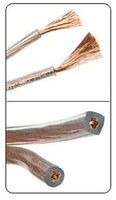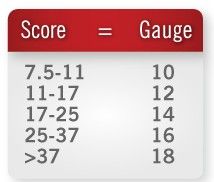Speakers - How to get Replacement Speaker Wires
- ACME Hi Fi
- :
- ACME Hi Fi Knowledge Base
- :
- Knowledge Articles Knowledge Base
- :
- Speakers Knowledge Base
- :
- Speakers - How to get Replacement Speaker Wires
Speakers - How to get Replacement Speaker Wires
Type content here.
You are able to contact AcmeHifi support and they said they could get me will get you a new set overnight shipping. They will do this once for every Acme customer. Here’s the contact link.
Here is this super helpful diagram for reconnecting the unit.
They even included a couple of extension wires, in case you need to connect a speaker at a good distance from the unit itself. When using the connector caps, be sure to give them a good 10 twists. Getting those teeny wires to wrap together can take a few spins. I found that the longer the exposed wires, at least an inch, the better. Also, use the color stickers and a marker to code and label the wires. This way in your next move, you can be all set to reconnect in a jiffy.
This is a good post in our community about product warranties.Elite warranty
thanks @Al for the AS!!
Here's some more great info about speaker wires. There's so much info out there. Thought this would be an appropriate thread.
So what’s the deal with all the different kinds of speaker wire?
There isn’t a more controversial topic in the world of audio. In one corner, you have the true believers asking incredulously: “What do you mean you can’t hear the difference? There must be something wrong with your ears.” In the other corner you have an equally emotional response: “Stop it! There IS no difference”.
Meanwhile, most audio equipment makers, fearful of offending their dealers who make a lot of cold hard cash selling speaker cables, remain mute. We aren’t compromised by such concerns, so we’re going to give it to you straight.
This controversy itself is a little hard to understand, considering that it has been so thoroughly researched with scientific studies, precise measurements and double-blind listening tests. Especially since the overwhelming evidence has all come down on one side. The results? People can’t actually hear any difference as long as they follow some simple best practices. So why does the cabling industry exist? That’s pretty simple: It’s phenomenally profitable. It’s definitely in their best interest to make you believe that their magical cables sound better.
It’s a bitter pill to swallow, but no amount of pseudo-scientific features like oxygen-free copper, skin effect, vacuums, dielectric biasing, or cable resonance make any difference at all. A $50 spool of 12-gauge zip-cord will perform like a $15,000 run of space-age laser wire. If you need a shoulder to cry on or a buddy to talk to, we’re here for you.
So why would I want expensive speaker wire?
Well, expensive speaker wire is typically of excellent build quality, it (usually) will make your speakers sound fantastic as all good wire should, and it has the added benefit of being extremely aesthetically pleasing. If your entertainment center is a showpiece in your home, attractive cabling and wire can be that extra touch that makes your home theater truly shine. For more on the subject of who needs expensive audio cables, check out this article from our friend @Will
What DO I need to consider?
Well, just because we think you shouldn’t spend too much on speaker wire doesn’t mean there aren’t some things you should consider. What you’ll want to pay attention to is the one thing most likely to make a difference: electrical resistance.* Lower resistance is better and three things affect it: the wire’s conductivity, length, and thickness.
Conductivity
Copper is cheap and a great conductor, so almost all speaker cables are made from it. Any advantage gained by using a better conductor can easily be compensated for with slightly thicker wire. So fortunately, we can ignore this and concentrate on length and thickness.
Length
Twice the wire length gives you twice the resistance. This means that you’ll need either more amplification or a wire with better resistance to get the same sound as a shorter run of wire. That’s all there is to it.
Thickness
Thicker wire results in lower resistance. This is good. A wire’s thickness is measured in gauge (AWG), with a thinner wire having a bigger gauge number. When the wire’s gauge increases by three, its cross-sectional area will be halved and its resistance doubled. As an example, 12-gauge wire will have ¼ the resistance per foot of 18-gauge wire. So lower gauge wire tends to be better.
The first thing to know is that getting heavier wire than you need won’t hurt anything, but because it costs more and is harder to hide, you probably want to know what the thinnest wire you can get without compromising your sound. Here’s how to choose speaker wire?
- Calculate the length of the wire run. Try to keep it as short as you reasonably can, but don’t forget to include all the up, overs, arounds and unders you’ll need to get the wire from your receiver to your speakers.
- Determine the “nominal impedance” of your speakers. If you can’t find this number on the speaker, in the owner’s manual or on a website, you can measure the resistance with an ohm meter and multiply the reading by 1.3 to get a good estimate.
- Now, ask yourself how important the sound is to you. If you are an extreme audiophile and these are your main speakers, assign this wire run a score of 50. If you care a lot about the sound quality but don’t feel like obsessing over tiny differences, then a 100 will do. If the speaker is for a less critical situation like background sound or distributed audio, try 200 to 400. Of course, you can estimate for shades in between. This rating will become your own personal “pickiness index”.
- Now multiply your pickiness index by your speaker’s nominal impedance – then divide this by the feet of wire needed for the speaker run. Say you are a picky but non-obsessive listener with 6 ohm speakers and your wire run needs to be 32 feet. You’d multiply 6 by your “pickiness index” of 100, which equals 600. Then divide 600 by your 32 feet of wire, and the resulting score is 18.75. See where your score falls on the chart below to determine the speaker gauge we recommend.
Other Considerations
- For critical applications, it’s a good idea to limit the length of wire runs to 50 ft. This is because speaker wire has two other electrical properties in addition to resistance – capacitance and inductance – that can start to cause trouble with long runs of wire. These are special kinds of resistance that vary with frequency. Speaker wire inductance can slightly attenuate the highest treble while capacitance can make your receiver work harder. However, runs of up to 100 ft are fine for whole-house background audio.
- Check to make sure the cables are well made, especially if the wires are terminated with some kind of connector. The connector should be soldered or connected securely.
- Bare wires, by the way, are every bit is good as fancy connectors. Over time, the connector-to-wire and wire-to-speaker interfaces can develop “contact resistance” that can be many times greater than the wire itself. Gold, with its inability to oxidize, makes a good contact surface.
- Make sure that the wire has a designation to indicate which side is which. This way, you can easily connect the “positive” from your amp to the positive of your speaker without trying to figure out what’s at the other end of the wire you’re holding. This will make your life a lot easier if you’re far away from the amplifier.
- Stranded wire is more flexible and easier to route than solid wire.
- As long as you have an adequate gauge of wire, don’t worry too much about wire runs being different distances for the left and right speakers as long as they aren’t dras.
- Mark as Read
- Mark as New
- Bookmark
- Permalink
- Report Inappropriate Content
Wow! This was very informative. Thank you for the writeup. ![]()
- Mark as Read
- Mark as New
- Bookmark
- Permalink
- Report Inappropriate Content
CẬP NHẬT TIN TỨC NÓNG HỔI, MỚI NHẤT TỪ LIÊN MINH OKVIP INFO
Chuyên mục Tin Tức của liên minh OKVIP là kênh thông tin uy tín và đa dạng, mang đến cho người đọc những tin tức mới nhất, nóng hổi và chính xác nhất về nhiều lĩnh vực khác nhau. Tìm hiểu chuyên sâu về chuyên mục tin tức liên minh OKVIP qua bài viết sau:
https://okvipvn.info/tin-tuc/
#okvip #okvipvn #lienminhokvip #okvipinfo #linksokvip #cong_ty_okvip #huong_dan_okvip #tintucokvip
- Mark as Read
- Mark as New
- Bookmark
- Permalink
- Report Inappropriate Content
Thanks for sharing this information post. Discover the significance of “What Does 750 meaning in gold?” Learn about the purity of gold and its implications for authenticity and value in jewelry craftsmanship.





